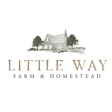
Getting Ready for Springtime - Planting, Gardening and More
On this episode of the Little Way Farm and Homestead Podcast, Mathew and Carissa share their excitement for the upcoming Springtime growing season. During this episode they discuss things to consider when preparing to plant seeds for the springtime, helpful tips from their own experiences at the farm and more. There is so much to consider when beginning a garden and considering growing some of your own food that it is imperative we take time to consider what we want to grow, how we want to use what is grown, and schedule the planting, growing and harvesting tasks so that we can be successful and have an enjoyable experience.
Real Estate for Life is a real estate brokerage with over 1,400 Prolife Real Estate Agents worldwide. They have completed over 10,000 real estate transactions and they report 65% of their revenue goes to a Prolife or Catholic Apostolate. You can quickly find an agent near you through their website at Realestateforlife.org. And if you let them know that you learned about Real Estate for Life from Little Way Farm and Homestead, that helps support our family in continuing the work of Little Way Farm and Homestead. Now, back to the episode.
Link: https://realestateforlife.org/
___
For more information about Little Way Farm and Homestead including the farm, podcast, and upcoming events, check out https://littlewayhomestead.com/.
For media inquiries, advertising, speaking request, guest referrals, consulting and more - email us at hello@littlewayhomestead.com.

